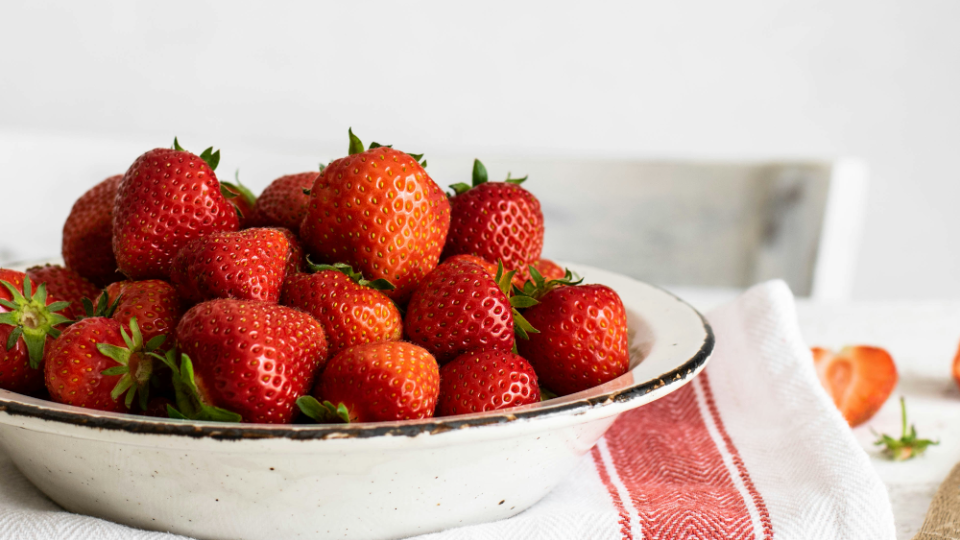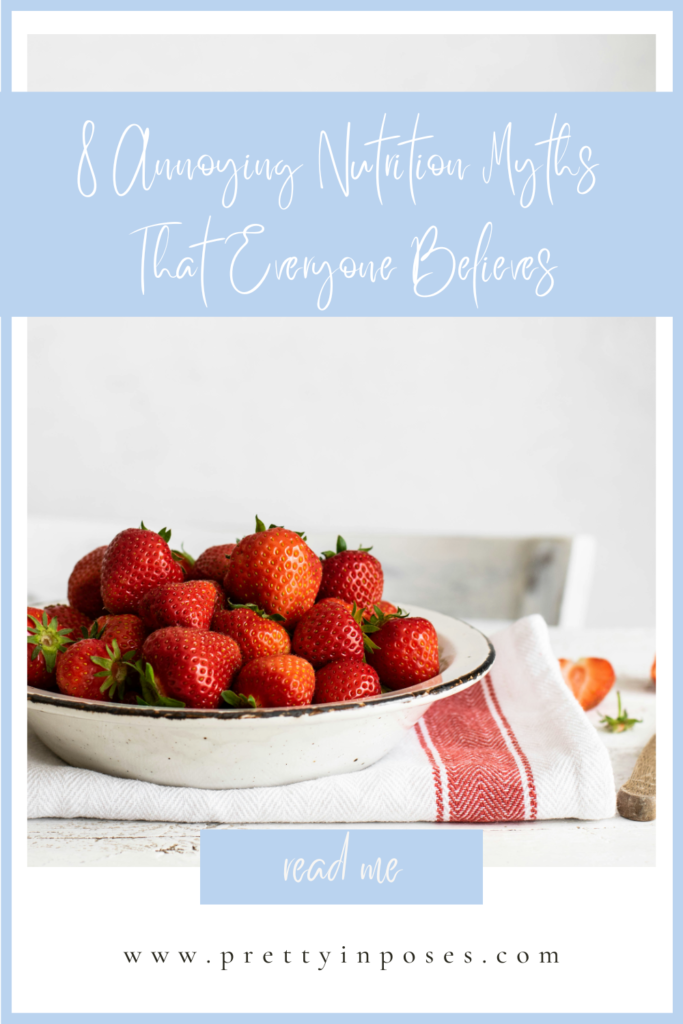
Do you want to eat healthier but aren’t sure where to start?
Well, who can blame you? With all the conflicting information out there, it can be hard to discern what’s good for you and what isn’t.
That’s why in this post, we’re tackling eight of the most annoying nutrition myths everyone believes.
Where Do the Most Common Nutrition Myths Come From?
According to nutritional experts, many common nutrition myths we see today come from various sources.
This could be diet culture, personal anecdotes, and even fallacies in research. However, in instances like these, it is important to remember these facts:
One, companies can and often do misrepresent and or…lie to sell products.
Two, just because something worked for someone else doesn’t necessarily mean it will work for you.
And third, research can be done poorly.
The best thing you can do for your nutritional journey is to get your information from credible sources whether online or through a certified professional (i.e., nutritional, medical, or fitness expert).
Annoying Nutrition Myths
These are some of the most annoying nutrition myths out there, mainly because they’re so widespread.
And if everyone is sharing the same erroneous information, it makes it harder for people to live a happier, healthier life.
Which…is kind of what we all want, right?
Eating Healthy Is Too Expensive
This dietary myth is actually understandable. Healthy food can be expensive.
Have you ever tried to purchase real olive oil?
But, this doesn’t mean all healthy food is expensive or you can’t eat healthier on a budget.
You can do plenty of things to incorporate nutritious food for cheap.
This includes meal prepping to prevent overspending, utilizing coupons, choosing canned or frozen foods (without the added salt or sugar), and buying in bulk.
These are just a few options to make nutrition more accessible to you.
Gluten-Free Is Healthier
A lot of brands advertise gluten-free on their labels which may cause people to believe there’s something wrong with eating products made with gluten.
However, gluten is a protein found naturally in wheat and other grains.
It’s also added to foods during processing for texture and flavor as well as a host of other commercial items (i.e., beauty supplies, supplements, and medications).
Gluten should only be avoided in people with celiac disease (a rare autoimmune response to gluten) and those with a gluten sensitivity or wheat allergy.
Otherwise, your diet may need to include important nutrients and calories.
Avoid Carbs to Lose Weight
Carbohydrates or carbs are macronutrients that the body needs to function. They are fiber, starches, and sugars found in different foods and drinks.
It is not the carbs you want to stay away from but the type of carbs. These macronutrients come in simple and complex forms.
The simple carbs are found in foods like cookies, candies, and pastries. These carbs lack vitamins, minerals, and fiber and can lead to inflammation in the body.
On the other hand, foods with complex carbs such as whole-grain breads, quinoa, and vegetables are rich in nutrition that the body needs. So, if you want to lose weight, avoid the simple carbs.
Don’t Eat After 7 P.M.
Many dietitians tell their clients not to eat after a certain time but it’s not for the reasons you may think.
Consuming meals in the evening is associated with eating more calories. This is why people think eating later leads to weight gain.
Also, most people go to bed between 10 and 11 P.M. Having dinner so close to bedtime could disrupt your sleep and cause digestive distress like indigestion.
But there is no scientific evidence to suggest you shouldn’t consume food at or after 7 P.M. If you do eat into the night, make sure the meal is light and healthy.
Smoothies & Fruit Juices Are Healthy
Smoothies and fruit juices may seem like a good way to get all your essential nutrients but…it’s likely not the healthiest option for you.
The reason is that whether it’s homemade or purchased, your drink is probably laden with sugar.
People often put too many ingredients inside their drinks that they normally wouldn’t consume in a single sitting.
Also, since the drink would have less fiber than eating whole foods, there’s nothing to prevent your blood sugar from spiking.
Consuming these drinks regularly can lead to health issues such as type II diabetes. Another thing you should be wary of is that some fruits and vegetables don’t mix well.
This can cause inflammation in the body resulting in indigestion.
Finally, because of the amount of food that tends to be blended into these drinks, the calories are usually very high which may result in weight gain.
But that doesn’t mean smoothies and juice can’t be a healthy part of your diet if made properly.
This involves reducing the amount of items blended or juiced and using them as replacement meals instead of snacks.
All Sugar is Bad
Labeling sugar as “bad” is somewhat difficult because there are different types.
Sugar is a form of carbohydrate, which we know from earlier is a macronutrient.
Carbs are classified into two subtypes of sugar: monosaccharides or “simple sugars” and disaccharides.
The monosaccharides contain one molecule and include glucose, fructose, and galactose.
Disaccharides have two molecules and consist of sucrose, lactose, and maltose.
Nearly everything we consume has sugar in it, whether it’s fruit, vegetables, grains, milk, etc…
Fruits and some vegetables naturally have fructose, glucose, and sucrose inside them. Dairy is known for its lactose and maltose is the sugar found in germinating grains.
Other sweeteners like honey and table sugar naturally contain both fructose and glucose.
Sugars that are added to foods and drinks during the making and manufacturing of a product have been linked to weight gain and a heightened risk of other chronic illnesses.
However, the natural sugars in foods like fruits, vegetables, dairy, and whole grains are not associated with ill health effects.
Remember that when blending your foods in a smoothie, for instance, or when adding a sweetener like honey to your drink, the natural sugar turns into “free sugar” and can provide many of the same health issues as table sugar.
Everything in Moderation
“Everything in moderation”. We’ve heard the phrase countless times since we were kids but can you believe this conventional wisdom is actually a myth? Yep, according to science that is.
Researchers found the saying “everything in moderation” is used more as a license to make just as many, if not more, unhealthy food choices as they do healthy ones.
This kind of consumption outweighs the benefits of eating good dietary foods, putting individuals at risk for chronic health conditions like diabetes.
Experts suggest that rather than choosing a diverse diet where people eat good and bad foods, they should simply eat smaller amounts of quality good foods instead.
A basic healthy diet is better than a poor diverse diet any day of the week.
Detoxes Cleanse Toxins From the Body
We think of a detox as a magic potion that will cleanse all the toxic waste from our body leaving us healthier than ever. But this is really a fairy tale and has no basis in fact.
In reality, our bodies were made to get rid of toxins and it doesn’t require outside help.
It is not true that toxins build up in your organs or anywhere else, for that matter.
If you are trying to lose weight on a detox, it might work temporarily, but you’ll more than likely gain the weight right back wasting time and money.
Plus, detoxes can be quite restrictive and dangerous. So, if you want to assist your body in its detoxification process change your diet.
Limit processed, high-fat, and sugary foods and adopt a meal plan full of vegetables, fruits, and other whole foods.
Common Nutrition Myths DEBUNKED
Those were eight common nutrition myths that we debunked but there’s still so much misinformation being spread every second.
But hopefully, you have a better idea now of what’s true, what’s not, and where to find the knowledge you need to set the record straight.







Leave a Reply